Question 2 Skills: Language Analysis | English Language for GCSE/IGCSE - Class 10 PDF Download
| Table of contents |

|
| Introduction |

|
| Overview of Language Analysis |

|
| Exploring words and phrases |

|
| Language features and techniques |

|
| Incorporating language analysis into your answer |

|
| Analysis |

|
Introduction
Question 2(d) assesses your capability to investigate, interpret, and evaluate a writer's language choices. This involves understanding both the explicit and implicit meanings of words and phrases, as well as the reasons behind a writer's choice of language. Below is a detailed explanation of how to conduct language analysis, categorized into:
- Overview of language analysis
- Exploring words and phrases
- Language features and techniques
- Incorporating language analysis into your response
Overview of Language Analysis
To delve into, remark on, and dissect the linguistic choices made by a writer, it is essential to comprehend:
- What is being depicted or narrated (comprehending the text)
- The specific selections the writer has made (subject terminology)
- The explicit and implied significances behind these selections (denotations and connotations)
- The overall impact or meaning the writer aims to convey
The task will require you to showcase three instances of words or phrases per section. It is crucial to meticulously choose words or phrases that you can analyze in depth, rather than solely focusing on evident literary techniques (like a simile). Merely recognizing a technique employed by a writer will not suffice for achieving marks. The key is to contemplate the message conveyed by the application of that technique. What visual does the writer seek to create with their expressions? Primarily, you must ponder over the reasons behind the writer's choices and ensure your word or phrase selection is concise and to the point (avoid analyzing entire sentences).
Exploring words and phrases
Analyzing language involves understanding why writers choose specific words or phrases in their writing and for what reasons. It requires considering both denotation and connotation:
- Denotation = the literal meaning of a word or phrase
- Connotation = the associations or implied meanings of the word or phrase
When evaluating words and phrases from the text, it's beneficial to ponder why the writer opted for those specific words in their sentences. Here are some inquiries you might pose to yourself during your analysis: The following table provides you with a list of some terms and definitions to use when analysing individual words and phrases:
The following table provides you with a list of some terms and definitions to use when analysing individual words and phrases: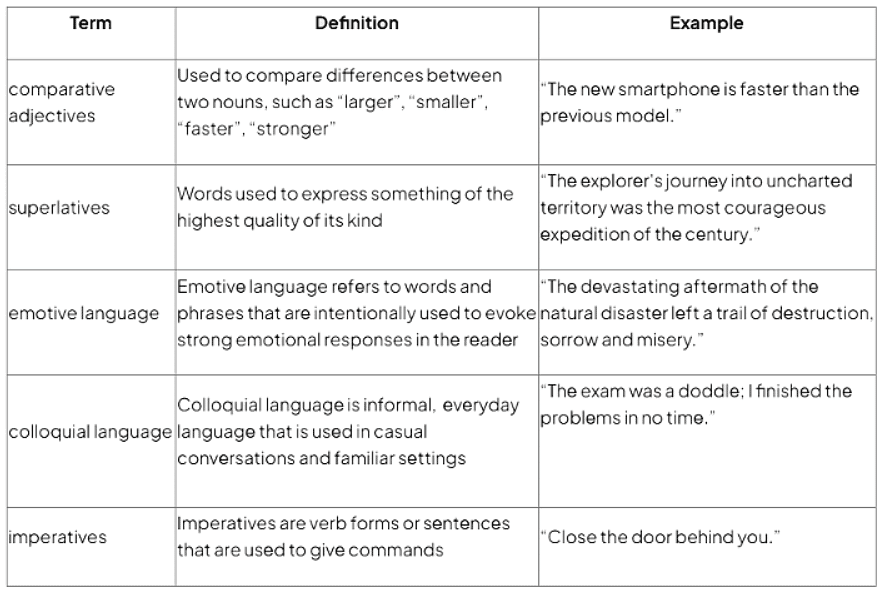
Once you can pinpoint specific words and phrases in a text, it's crucial to enhance this skill by contemplating the writer's reasons for incorporating them into their writing.
For instance, let's delve into some of the words and phrases listed in the table above and examine the writer's intentions.
Language features and techniques
- Understanding key literary terms is essential to support your text analysis. However, it's crucial to explain the intended effects of these terms clearly.
- The following table offers definitions of important literary terms. It serves as a helpful guide for analyzing a text effectively.
- Identifying and comprehending various literary techniques is just the beginning. It's equally important to delve into why an author employs these techniques in their writing.
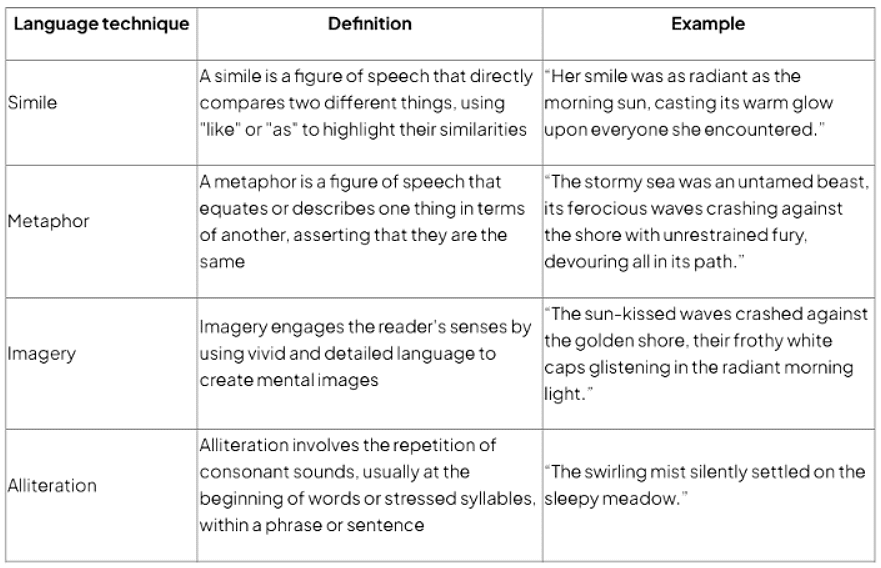
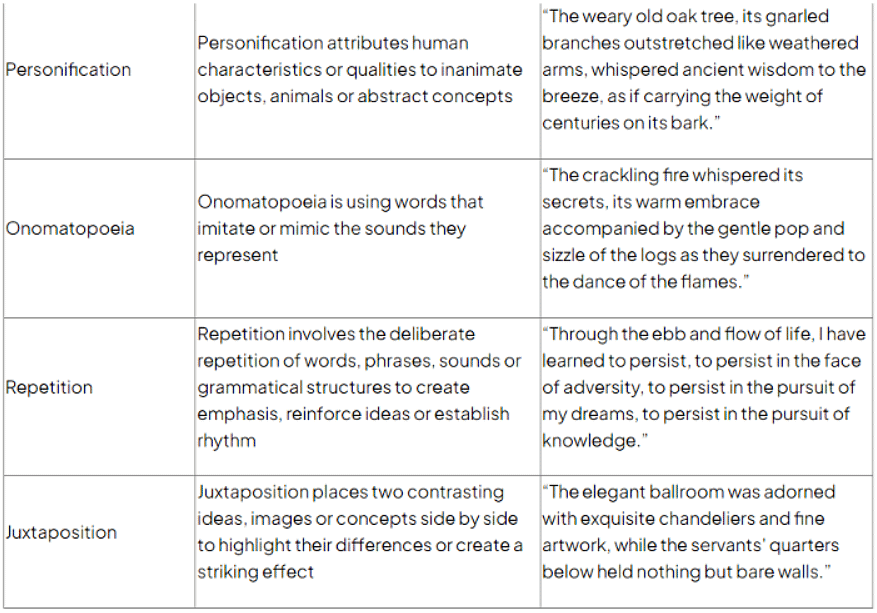
- After recognizing and comprehending various literary techniques, you should enhance this ability by delving into why the writer opted to incorporate these techniques in their writing.
- For instance, let's examine one of the language techniques from the table above and ponder the writer's intentions.
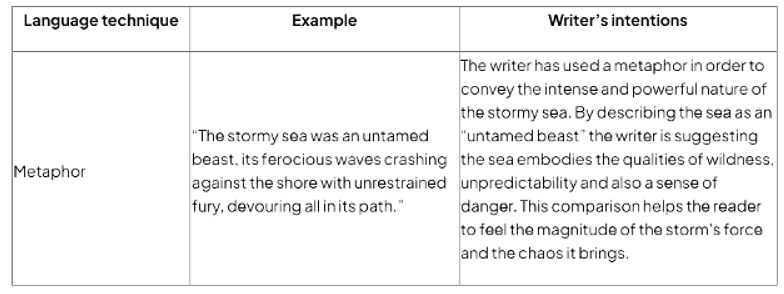
- In this instance, the metaphor employed by the writer to depict the turbulent sea is thoroughly interpreted and examined. The analysis has contemplated the rationale behind the writer's selection of a metaphor and delved into its intended impact on the reader.
Incorporating language analysis into your answer
Remember, you are being evaluated on your ability to choose appropriate words or phrases from the text for analysis. However, selecting the correct language for commentary is just one aspect of the task; you must also seamlessly integrate language analysis into your response in a lucid, logical, and succinct manner.
A high-level response will:
- Select relevant and concise words or phrases from the text to comment on
- Incorporate these words or phrases into an explanation of meaning
- Embed those directly quoted words or phrases into your sentences, giving context to the quote
For instance: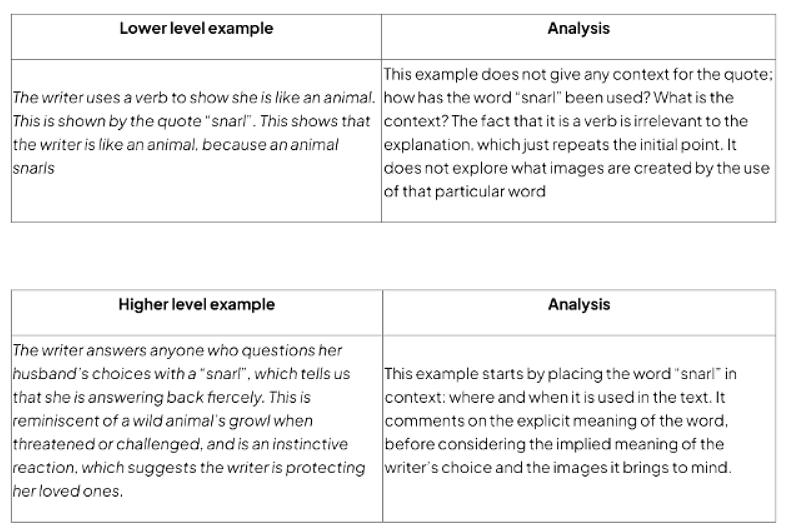
- Always provide context to the quote being used:
- Explain the situation in which the quote has been used.
- Describe what the quote is being used to convey.
- Consider the literal meaning of the word or phrase first.
- Explore the implied meaning of the word or phrase and why the author selected it.
Analysis
If you consider all previous questions as an autopsy, then this Analysis question resembles a trial. Just as a lawyer or investigator would, you must scrutinize the evidence—in this case, your text extract—and pose three key questions to uncover the truth:
- What have they done?
What have they written about? What’s the meaning and purpose of the text? - How have they done it?
What writing techniques have they used? Think of your figurative language techniques. - Why did they do it?
What effect were they hoping to achieve? How do they want you to think and feel?
How do you respond personally to the text – was the writer’s intention successful?
|
16 videos|45 docs
|
FAQs on Question 2 Skills: Language Analysis - English Language for GCSE/IGCSE - Class 10
| 1. What are some common language features and techniques that students should look out for when analyzing a text in the IGCSE English Language exam? |  |
| 2. How can students effectively explore words and phrases in a text during the Language Analysis task in the IGCSE English Language exam? |  |
| 3. What is the purpose of conducting a Language Analysis in the IGCSE English Language exam? |  |
| 4. How can students improve their language analysis skills for the IGCSE English Language exam? |  |
| 5. What are some tips for effectively answering the Language Task question in Paper 1: Reading of the IGCSE English Language exam? |  |














